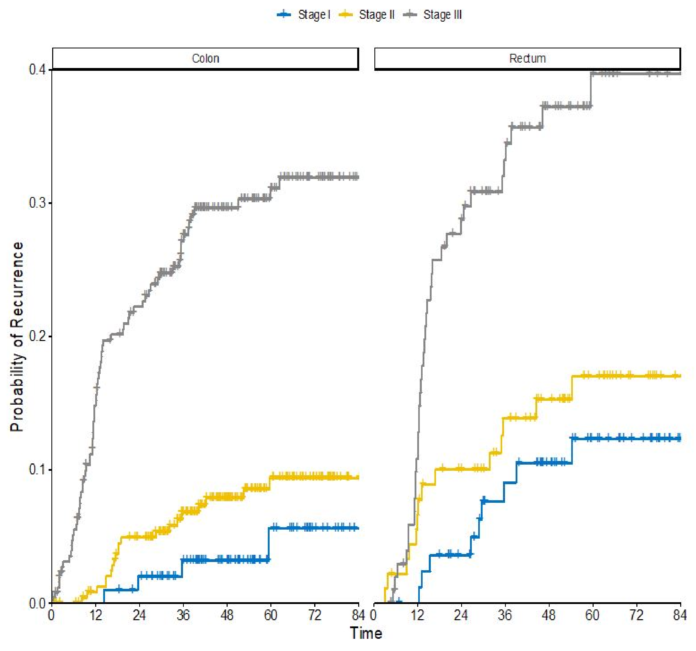
Unveiling the Truth: A Deep Dive into Colon Cancer Recurrence Rates
Colon cancer is one of the most common types of cancer worldwide, accounting for approximately 10% of all cancer cases. While advancements in medical treatments and screening methods have improved survival rates for patients with colon cancer, recurrence remains a significant concern. Understanding the factors that contribute to recurrence rates is crucial in developing effective strategies for prevention and long-term management.
Recurrence is defined as the reappearance of cancer cells after a period of remission or successful treatment. In the case of colon cancer, several factors can increase the likelihood of recurrence. One of the significant factors is the depth of tumor invasion into the colon wall. Studies have shown that patients with tumors that have penetrated beyond the innermost layer of the colon wall, known as the mucosa, are at a higher risk of recurrence compared to those with tumors confined to the mucosa.
Another important factor is the presence of lymph node metastasis. Lymph nodes are small, bean-shaped organs that play a crucial role in the immune system. When cancer cells spread to lymph nodes near the colon, the chances of recurrence increase significantly. Surgical procedures that involve the removal and examination of lymph nodes, known as lymph node dissection, aim to identify any tumor spread and guide subsequent treatment decisions.
Apart from tumor depth and lymph node involvement, the tumor stage at the time of diagnosis also plays a crucial role in determining recurrence rates. The American Joint Committee on Cancer (AJCC) staging system is commonly used to classify the extent of colon cancer. The system takes into account various factors, including tumor size, invasion depth, lymph node involvement, and the presence of distant metastasis. Patients with advanced stage tumors, particularly those with distant metastasis, have higher recurrence rates compared to early-stage cases.
Significant progress has been made in identifying biomarkers that can predict colon cancer recurrence. Biomarkers are measurable substances or genetic abnormalities that provide information about a disease’s progression or response to treatment. For example, elevated levels of carcinoembryonic antigen (CEA), a protein released by colon cancer cells, have been linked to an increased risk of recurrence. Regular monitoring of CEA levels allows physicians to detect potential relapses early and initiate timely interventions.
The treatment approach for colon cancer often includes a combination of surgery, chemotherapy, and, in certain cases, radiation therapy. Adjuvant chemotherapy, given after surgery, is commonly used to reduce the risk of recurrence by targeting potential microscopic cancer cells that may have spread beyond the visible tumor. The duration and intensity of adjuvant chemotherapy vary based on individual risk factors, tumor characteristics, and patient tolerance.
Advancements in genomic research have unveiled molecular subtypes of colon cancer that have distinct prognostic implications. The Cancer Genome Atlas (TCGA) project, a collaborative effort of the National Cancer Institute and the National Human Genome Research Institute, identified four subtypes of colon cancer based on their genetic profiles. These subtypes, known as CMS1 to CMS4, offer insights into the disease’s biological behavior and response to treatment, helping tailor therapies to individual patients.
In recent years, immunotherapy, a treatment modality that utilizes the power of the immune system to target cancer cells, has emerged as a promising approach for many types of cancer, including colon cancer. Immunotherapy drugs, such as immune checkpoint inhibitors, have revolutionized cancer treatment, offering durable responses and improved survival outcomes in some patients with advanced disease. Ongoing research aims to identify patients who can benefit the most from immunotherapy and develop novel combinations with existing treatments to further enhance response rates.
Preventing colon cancer recurrence requires a multidimensional approach. Regular screening, such as colonoscopies, can help identify precancerous growths, known as polyps, and remove them before they progress to cancer. Making lifestyle modifications, including adopting a healthy diet rich in fruits and vegetables, exercising regularly, maintaining a healthy weight, and avoiding tobacco and excessive alcohol consumption, can also reduce the risk of recurrence.
In conclusion, colon cancer recurrence rates are influenced by various factors, including tumor depth, lymph node involvement, stage at diagnosis, and the presence of biomarkers. Advances in molecular profiling and immunotherapy have provided new insights and potential treatment options for patients with recurrent colon cancer. However, early detection and prevention remain crucial in managing this challenging disease. Continued research and efforts to improve screening, treatment, and supportive care will pave the way for better outcomes and quality of life for individuals battling colon cancer.












